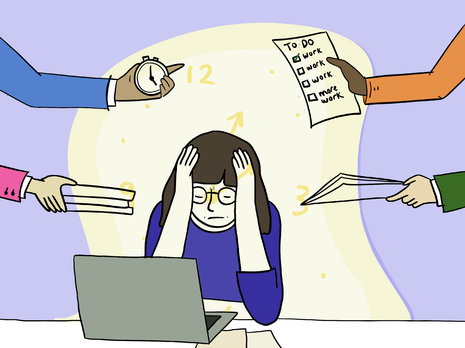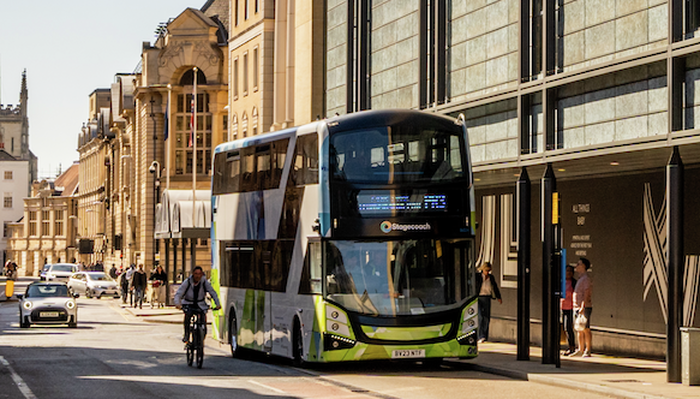Why are we so obsessed with getting more done?
Cerys Burch examines the rise of optimisation culture and why our relentless pursuit of efficiency may be doing more harm than good

It seems that no matter the degree, the pressure to optimise time looms over students. While some have to grit their teeth through Saturday lectures and 30+ contact hours, others are submerged in a sea of unstructured time, forced to craft their own routines to stay on track. While the long holidays appear to be a major advantage, it’s hard to see how these are real breaks when your reading list stacks higher than your Christmas tree. Cambridge’s unique 8-week term system dates back to medieval religious and agricultural practices, but strangely enough, modern-day life has changed quite a bit since then. Does this archaic structure still optimise our time today?
In an attempt to reduce this culture of optimisation, Colleges are implementing projects which seek to help students cope with their academic studies and mounting stress. At Murray Edwards College, Gateway sessions run weekly. These sessions aim to provide students with the tools to help with organisation, essay writing, and supervisions. Sessions like these provide much-needed support to help balance personal life alongside the unique challenges of the Cambridge workload.
“While the long holidays appear to be a major advantage, it’s hard to see how these are real breaks when your reading list stacks higher than your Christmas tree”
Professor Michael Coleman, a neuroscientist at Cambridge, explained that the length of Cambridge terms are “so short that it’s a real issue”. He recalled his time as an Oxford undergraduate as “incredibly intense” and “exhilarating” but also “absolutely exhausting and never feeling like the best way to organise things.” He recognised “a culture of pushing people to work extra hard,” adding that, “the question is whether that’s productive, especially if it’s done from a position of fear.”
With the business of Cambridge terms, finding time for ‘unproductive’ tasks can seem impossible. Time off is labelled as procrastination and a waste of valuable time that could be spent on studies. However, distractions from work could be the difference between academic success and burnout, helping to break up the rigid structure of Cambridge life.
One student stated that “If I don’t wake up early my day is ruined,” with the amount of flexibility with certain courses requiring students to build their own schedules from scratch. When questioned about keeping a work-life balance, the student simply replied, “I don’t,” preferring to sacrifice social interaction to stay on top of work. HSPS student, Hannah, similarly expressed finding it “really hard to have a good work-life balance at Cambridge,” though she preferred “to push back a deadline so that I can go out and have fun without regretting not socialising more or trying something new.”
“Professor Coleman argues Cambridge needs to ‘provide an environment where people can not feel under threat all the time’”
A 2024 UK Student Wellbeing survey shows that the most important reason for student stress is the workload, with 66% linking this to not having enough time to balance other commitments. This suggests that outlets outside of university work are an essential part of ‘optimisation’ that is often ignored.
How can students manage their workload without succumbing to stress? Professor Coleman argues Cambridge needs to “provide an environment where people can not feel under threat all the time and not feel that they have to push themselves super hard, because sometimes if you have the right level of pressure, rather than excessive, that’s where the best ideas come out.”
Arguably ‘unproductive’ hobbies are an essential part of keeping this balance, with a Harvard Medical School study suggesting that having hobbies can have significant improvements to mental health, thereby helping to improve all-around performance. Just as athletes need rest to recover and perform at their best, students need to have time off to fully function. So what could this look like?
To de-stress, one student said, “I dance in my room with my headphones to relax.” They spend time doing online art competitions, saying, “it’s a good responsibility because it doesn’t really affect anything.”
“Sometimes I just need to eat, relax, sleep, or just go for a walk. I try and understand what I need in the moments that I can’t focus instead of pushing myself further,” she explained. Perhaps one of the most productive things could be to stop working. This resonates with Architecture student, Leonie, who said she found procrastinating studying by doing things such as “baking chicken pie at 9pm” to be worth it, feeling “more refreshed for the work I have to do after.”
Things deemed procrastination are crucial in providing a balance in hectic Cambridge life. Hannah said, “taking time to decompress and relax is just as, if not more important, than working.” So perhaps if you aspire to optimise your time, try baking a chicken pie rather than stressing over that assignment for another hour.
 News / Judge Business School advisor resigns over Epstein and Andrew links18 February 2026
News / Judge Business School advisor resigns over Epstein and Andrew links18 February 2026 News / Hundreds of Cambridge academics demand vote on fate of vet course20 February 2026
News / Hundreds of Cambridge academics demand vote on fate of vet course20 February 2026 News / Petition demands University reverse decision on vegan menu20 February 2026
News / Petition demands University reverse decision on vegan menu20 February 2026 News / CUCA members attend Reform rally in London20 February 2026
News / CUCA members attend Reform rally in London20 February 2026 News / Gov grants £36m to Cambridge supercomputer17 February 2026
News / Gov grants £36m to Cambridge supercomputer17 February 2026










